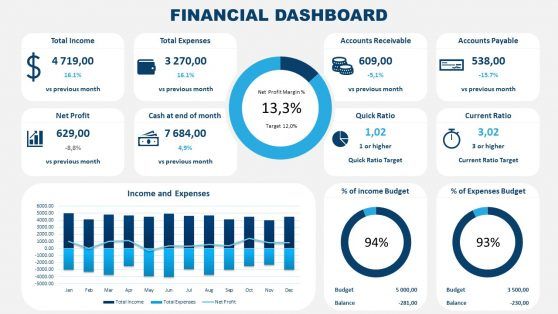Financial Literacy for Small Business: Bring Your A Game
Discover how financial literacy can drive growth for small business, improve decision-making, and ensure long-term success in today's competitive market.
3/11/20254 min read
In today’s ever-evolving business landscape, understanding the financial health of your small business isn’t just a nice-to-have—it’s a necessity. As we dive deeper into 2025, the importance of financial literacy for small business owners has never been more critical. Whether you’re a seasoned entrepreneur or taking your first steps, mastering financial concepts can unlock new opportunities and steer your business toward sustainable growth.
Why Financial Literacy Matters for Small Businesses
Financial literacy empowers small business owners with the tools to make informed decisions, plan strategically, and sidestep common mistakes. It’s not just about balancing the books; it’s about decoding the story your numbers tell and using that insight to propel your business forward.
Recent studies reveal that over 60% of small business owners lack essential financial skills, such as managing personal finances, overseeing payroll, and leveraging resources like the Small Business Administration (SBA). This gap can result in costly errors and missed growth opportunities.
We've identified Key Areas of Financial Literacy for Small Business Owners:
Cash Flow Management
Mastering cash flow is vital for any small business’s survival and growth. This means:
Tracking Inflows and Outflows: Stay on top of where your money comes from and where it’s going to maintain liquidity and avoid cash crunches.
Forecasting: Use historical data to anticipate future cash flow, helping you navigate slow months and maximize peak periods.
Effective Collection Strategies: Implement systems to ensure timely payments and manage receivables efficiently.
Profitability Analysis
Understanding and improving profitability is the cornerstone of long-term success:
Cost Control: Regularly review expenses to identify areas for savings without compromising quality.
Pricing Strategies: Set pricing that covers costs and delivers sustainable profit margins.
Product/Service Mix Optimization: Focus on promoting your most profitable offerings.
Financial Statement Literacy
The ability to interpret financial statements is crucial for making sound business decisions:
Balance Sheet: Assess your assets, liabilities, and equity to ensure a strong financial position.
Income Statement: Monitor revenue, expenses, and profits to gauge operational efficiency.
Cash Flow Statement: Understand how your income and expenses impact your cash reserves.
Budgeting and Forecasting
Strategic budgeting and forecasting are essential for financial literacy:
Realistic Budgets: Align budgets with your strategic goals and compare actual performance regularly.
Scenario Planning: Prepare for best, worst, and most likely outcomes.
Rolling Forecasts: Adapt to changing market conditions with flexible forecasting.
Debt Management
Knowing how to leverage debt effectively can fuel growth:
Leverage Wisely: Use debt strategically while ensuring terms are manageable within your cash flow.
Monitor Interest Rates: Stay informed about trends that could affect loan costs.
Debt Restructuring: Adjust debt structures when needed to improve financial health.
Investment in Growth
Making informed investment decisions is key to scaling your business:
ROI Analysis: Prioritize projects with the highest growth potential and minimal risk.
Diversification: Spread investments across areas to reduce risk and maximize returns.
Technology Investment: Assess the financial impact of adopting new technologies.
Tools and Resources for Enhancing Financial Literacy
Boost your financial literacy with these resources:
Financial Software: Platforms like QuickBooks, Xero, and FreshBooks simplify financial management and provide valuable insights.
Workshops and Seminars: Attend sessions tailored for small business owners to deepen your understanding.
Online Courses: Explore platforms offering courses on small business financial management.
Consulting Services: Partner with experts who can provide tailored strategies for your business.
Government Resources: Leverage free materials and guidance from organizations like the SBA.
Overcoming Challenges in Financial Literacy
While the benefits are clear, many small business owners face hurdles:
Time Constraints: Dedicate weekly time slots for financial learning and analysis.
Complex Financial Concepts: Start small and build your knowledge gradually.
Rapidly Changing Financial Landscape: Stay updated through newsletters and professional networks.
Lack of Personalized Guidance: Seek mentors or peer groups for shared learning.
Implementing Financial Literacy in Your Small Business
Put your financial knowledge into action:
Regular Financial Review: Set aside time weekly to review key metrics and statements.
Create a Financial Dashboard: Visualize your financial health at a glance.
Involve Your Team: Foster a culture of financial awareness within your organization.
Set Financial Goals: Define measurable objectives and track progress.
Seek Professional Advice: Consult experts for complex financial decisions.
The Impact of Financial Literacy on Your Small Business
Improving financial literacy can transform your business:
Better Decision-Making: Make informed choices about investments and operations.
Improved Cash Flow Management: Anticipate and address cash flow challenges proactively.
Increased Profitability: Optimize operations with smarter pricing and cost control.
Enhanced Ability to Secure Funding: Present a strong case to lenders and investors.
Long-Term Sustainability: Build a resilient business with a solid financial foundation.
Looking Ahead: Financial Literacy in the Digital Age
As 2025 continues, financial literacy for small business owners becomes even more crucial in the digital era:
Digital Payment Systems: Embrace options that enhance cash flow and customer convenience.
Cryptocurrency and Blockchain: Stay informed about emerging financial technologies.
AI in Finance: Leverage AI tools for forecasting and decision-making.
Cybersecurity: Protect your financial assets by understanding basic cybersecurity principles.
Empower Your Business Through Financial Literacy
Financial literacy isn’t just a skill—it’s a game-changer. By prioritizing your financial education, you’re laying the groundwork for smarter decisions, strategic growth, and long-term success.
Remember, financial literacy is a journey. As your business evolves, continue to seek new knowledge and adapt to the changing landscape. With a strong financial foundation, you’ll be ready to navigate the challenges and opportunities ahead in 2025—and beyond.
Ready to take the next step? Reach out to us at hello@yourtmg.com to learn more about our new service, TMG Books, and how our finance experts can help you secure your books and enhance your financial literacy for small business success.












Stay connected
The Makeover Group
Via di Belvedere 17, 50125,
Florence, Italy
© 2025. All rights reserved.